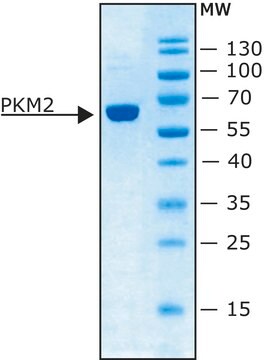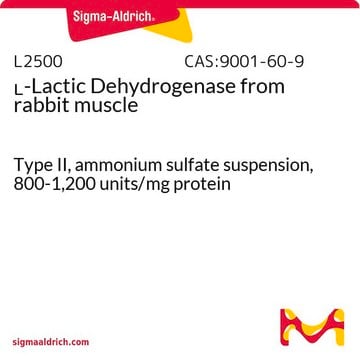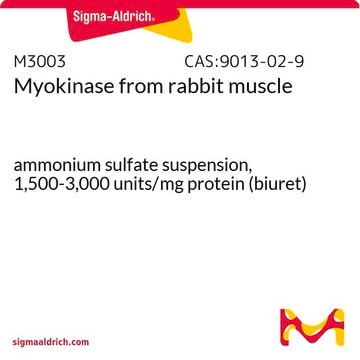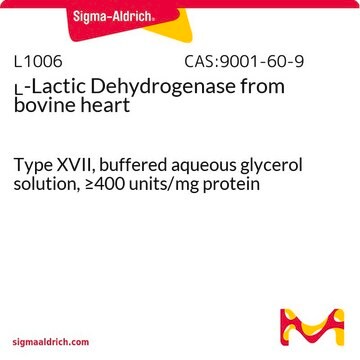P7768
Pyruvate Kinase from rabbit muscle
Type VII, buffered aqueous glycerol solution, 350-600 units/mg protein
Sinónimos:
ATP:pyruvate 2-O-phosphotransferase, PK
About This Item
Productos recomendados
tpo
Type VII
formulario
buffered aqueous glycerol solution
actividad específica
350-600 units/mg protein
mol peso
237 kDa
concentración
2.0-20.0 mg/mL
actividad extraña
lactic dehydrogenase and creatine phosphokinase ≤0.01%
phosphoglucomutase and myokinase ≤0.05%
temp. de almacenamiento
2-8°C
¿Está buscando productos similares? Visita Guía de comparación de productos
Descripción general
Pyruvate kinase plays a role in regulating cell metabolism. There are four pyruvate kinase isoforms in mammals (PKM1, PKM2, PKR, PKL). Mammalian pyruvate kinase is a tetrameric protein composed of identical subunits, arranged in a dimer-of-dimers configuration. Each monomer contains one active site and consists of three main domains- designated A, B, and C-along with a small N-terminal domain. The M2 isoform of pyruvate kinase (PKM2) supports anabolic metabolism and is expressed in cancer and normal tissue.
Aplicación
Acciones bioquímicas o fisiológicas
Isoelectric Point: 7.6
Optimal pH: ∼7.5
Optimal Temperature: 25°C
ΕA280 = 0.54 for 1 mg(p)/ml, 1 cm path
Reported KM values are ATP (0.86 mM), pyruvate (10 mM), ADP (0.3 mM), and PEP (0.07 mM) in Tris buffer at pH 7.4 and 30 °C. Pyruvate kinase is highly specific for phosphoenolpyruvate, but can utilize other dinucleotide triphosphates as substrates in place of ATP including GTP, ITP, dATP, UTP, and CTP.
Isoelectric Point: 7.6
Optimal pH: ∼7.5
Definición de unidad
Forma física
Nota de análisis
Código de clase de almacenamiento
10 - Combustible liquids
Clase de riesgo para el agua (WGK)
WGK 2
Punto de inflamabilidad (°F)
Not applicable
Punto de inflamabilidad (°C)
Not applicable
Equipo de protección personal
Eyeshields, Gloves, multi-purpose combination respirator cartridge (US)
Certificados de análisis (COA)
Busque Certificados de análisis (COA) introduciendo el número de lote del producto. Los números de lote se encuentran en la etiqueta del producto después de las palabras «Lot» o «Batch»
¿Ya tiene este producto?
Encuentre la documentación para los productos que ha comprado recientemente en la Biblioteca de documentos.
Los clientes también vieron
Nuestro equipo de científicos tiene experiencia en todas las áreas de investigación: Ciencias de la vida, Ciencia de los materiales, Síntesis química, Cromatografía, Analítica y muchas otras.
Póngase en contacto con el Servicio técnico











